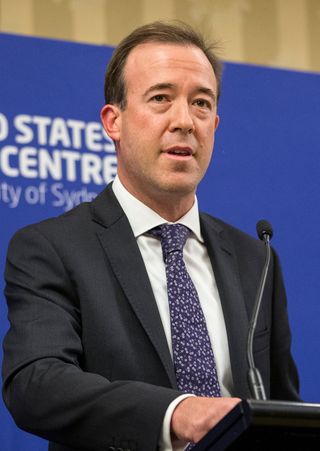The Australian
By James Curran
At once a sentimental bloke and a realist
As an opposition leader, Tony Abbott has been so ruthless and so effective in destroying the credibility of Labor's domestic agenda he has barely had to lift his gaze to the world beyond. But in two recent speeches — in Washington and Beijing — voters have been given a rare glimpse of how he understands Australia's place in the world. The picture is mixed.
The bar is usually set fairly low on such occasions for opposition leaders. As long as they don't rock the foreign policy firmament, the trip is deemed a success. In any case, Abbott would know that rarely in Australian politics does foreign affairs play a role in determining who wins government. Only once, in the Vietnam election of November 1966, has that been the case.
Nevertheless, it is telling that Abbott's first major overseas trip as the alternative PM included both the US and China. Clearly, he feels the sentimental call of the old powerful friend and the gravitational pull of the Asian economic giant. But, like other leaders before him, he had trouble in reconciling Australia's European inheritance to its Asian future.
In Washington, Abbott told the Americans what they wanted to hear. Trying to raise his voice above the din of doomsayers and dissenters, he rejected the claim that the US was in decline. It was still an ''exceptional'' nation.
But he did much more than try to prop up the pillars of US nationalism. Abbott's description of America as ''family'' and his contentious claim that ''few Australians would regard America as a foreign country'' was not only more pro-US than John Howard. It rewound Australian alliance rhetoric back to the late 1960s.
After all, it was John Gorton, and later Labor's Gough Whitlam, who moved Australia's relationships with Britain and the US to a new, more ''foreign'' footing. With Britain trending towards membership of the European Economic Community, and the US signalling its intention to play a more limited role in Asia after the shock of Vietnam, these governments saw no reason to maintain the intimacy of old. Australia would henceforth begin to treat the US and Britain just as it did France, Germany and Japan.
Gorton and his successor Billy McMahon had also learnt the harsh lesson that America did not necessarily share the same interpretation of ANZUS when it came to consulting Australia on matters of vital regional interest. A generation of politicians and policymakers learnt the hard way that to treat the US as ''family'' was a recipe for Australia not being taken seriously.
Abbott's speech in Washington had snippets of realism. He warned Americans that they could not take Australia's support for granted and that its national interests ''might not always be identical with America's''. But their impact was lost amid his strategic waltz through the world's trouble spots and washed away by his sentimentalism about the common values borne of the Anglosphere. Having extolled the benefits of the Anglosphere in Washington, Abbott had to find a way to connect to his Chinese audience. In Beijing, he defined Australia as an ''immigrant society'' from its founding in 1788, and asserted that those of Chinese ancestry in Australia ''appreciate Australia's British heritage''.
But the Anglosphere also carries uncomfortable baggage for Australia in Asia. In China, Abbott tried to quickly and quietly bury the foundational principle of Australia's British past: the ideal of a White Australia.
From today's perspective, only the extremist few would quibble with his description of the policy as an ''embarrassment''. Never mind, however, that from 1901 it had been a bipartisan faith for all those who believed in Australia's future as a ''white'' and ''British'' nation, including the leader who symbolised above all Australia's Anglospheric world view: Robert Menzies. Of course, with Menzies' departure in 1966, leaders on both sides of politics wisely realised the policy was crumbling beneath rapidly changing domestic and international circumstances, and from 1966-73 it was progressively dismantled.
It is true that some Asian leaders still dredge up the legacy of White Australia to taunt Australia. But it is difficult to think of a precedent where an Australian leader has addressed the spectre of ''white Australia'' in this way. At the very least, it shows an ongoing problem for Australians in finding a history that will connect the country to the region.
Pentagon planners would have bristled at Abbott's acceptance of Chinese military modernisation, but liked his tough talk on the South China Sea. Although, like most Western leaders, Abbott expressed hope for greater political liberalisation in China, he acknowledged ''shared interests'' would trump ideological differences. Whitlam, Fraser, Hawke, Keating and Howard all understood this. Abbott's proposal for an Australia-Chinese leadership dialogue can only further build confidence between the two countries.
But, like Julia Gillard, Abbott does not want to face up to the harsh realities of a world where America might not always be pre-eminent. In Washington, he said he did not want to face the prospect of ''what a shrunken America might mean''. It was an anxious cry reminiscent of Australian leaders in the early 20th century lamenting the possible waning of British imperial power. Yet in Beijing he talked of the US alliance being about ''building trust'' rather than ''picking sides'', and he seemed to eschew the Cold War language of containment.
The question, as always, is whether the strategic circumstances of the future will allow Abbott the luxury of maintaining the sharp divide between the two sides of his world view: his realism and his sentimentalism. There is a real risk that the contrasts between his gushing sympathy for the US and his tough realism towards China become so exaggerated that they turn his foreign policy into something of a parody.





